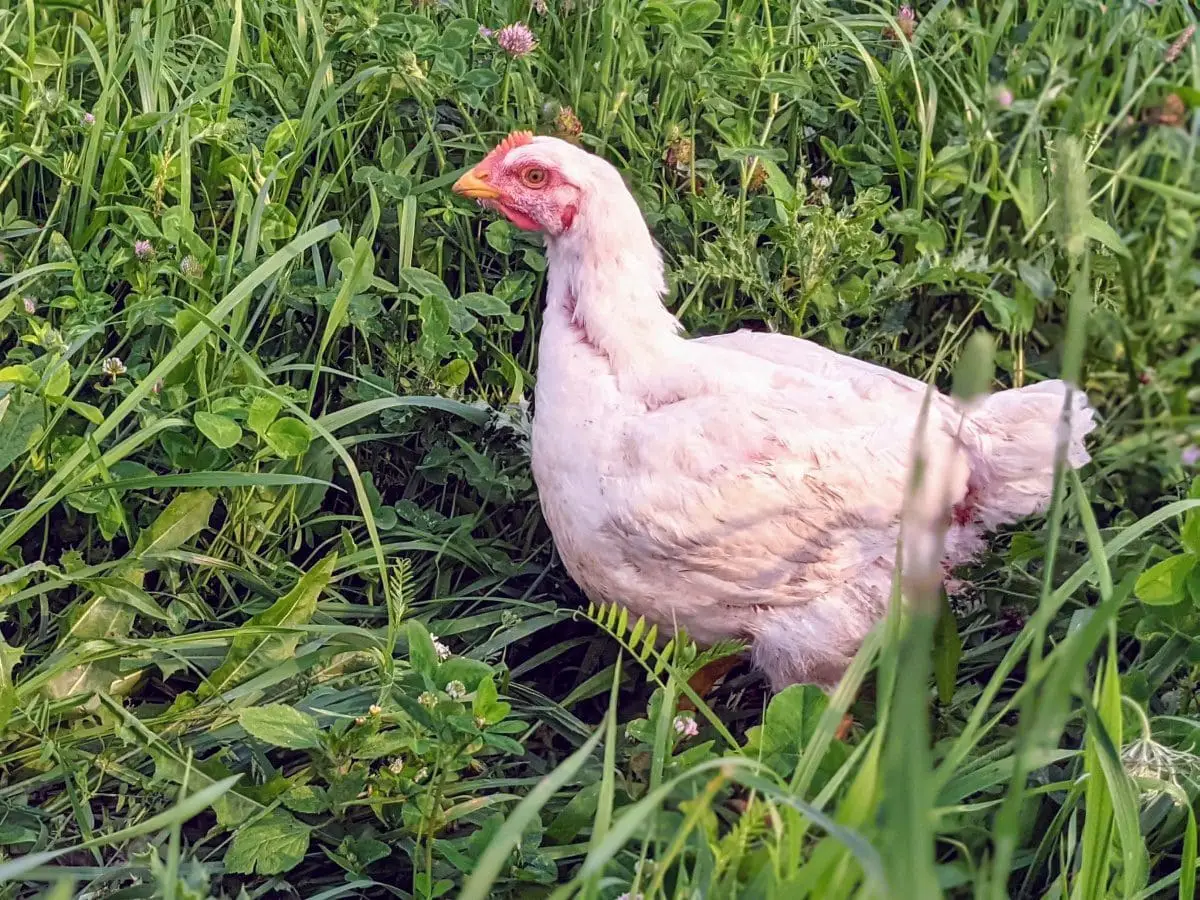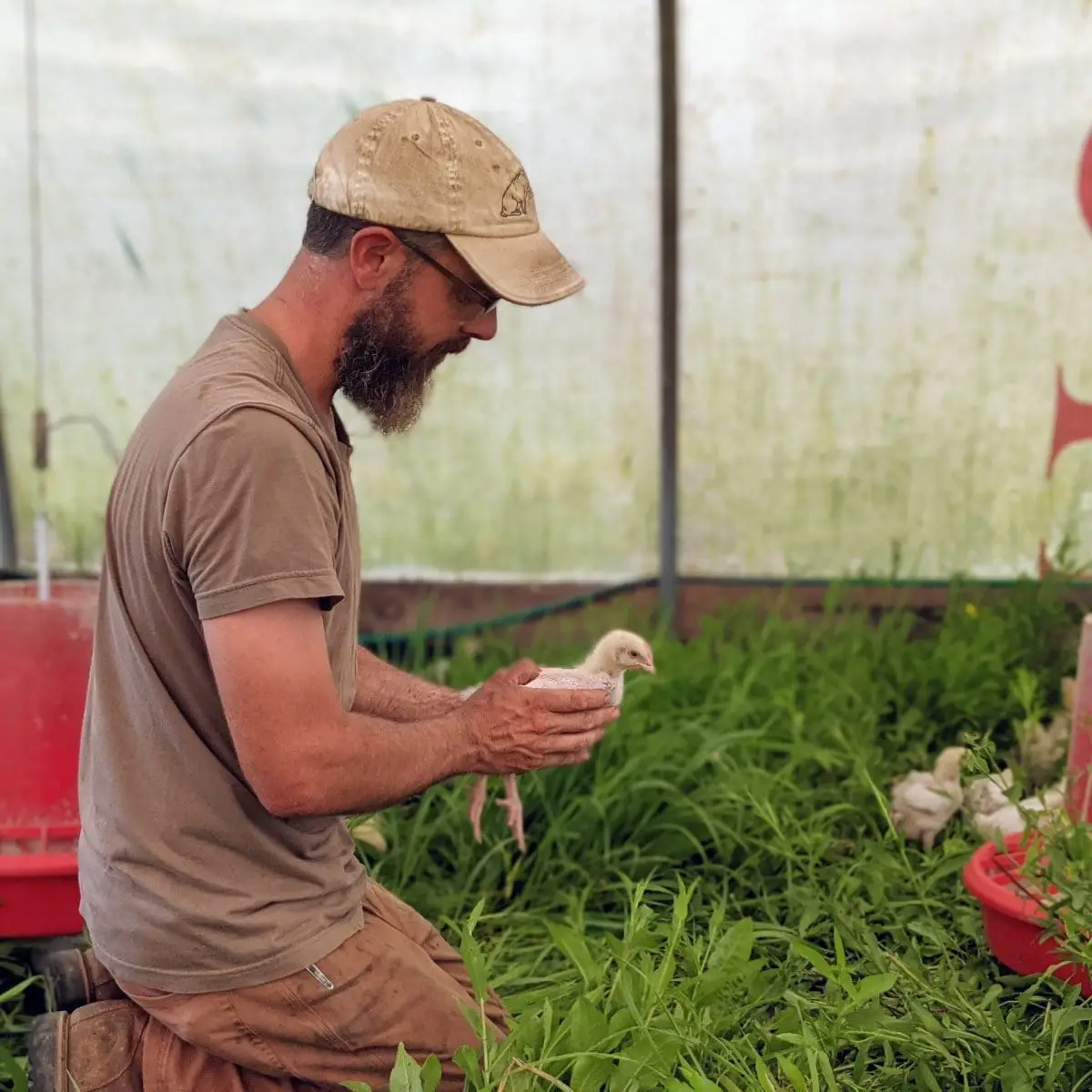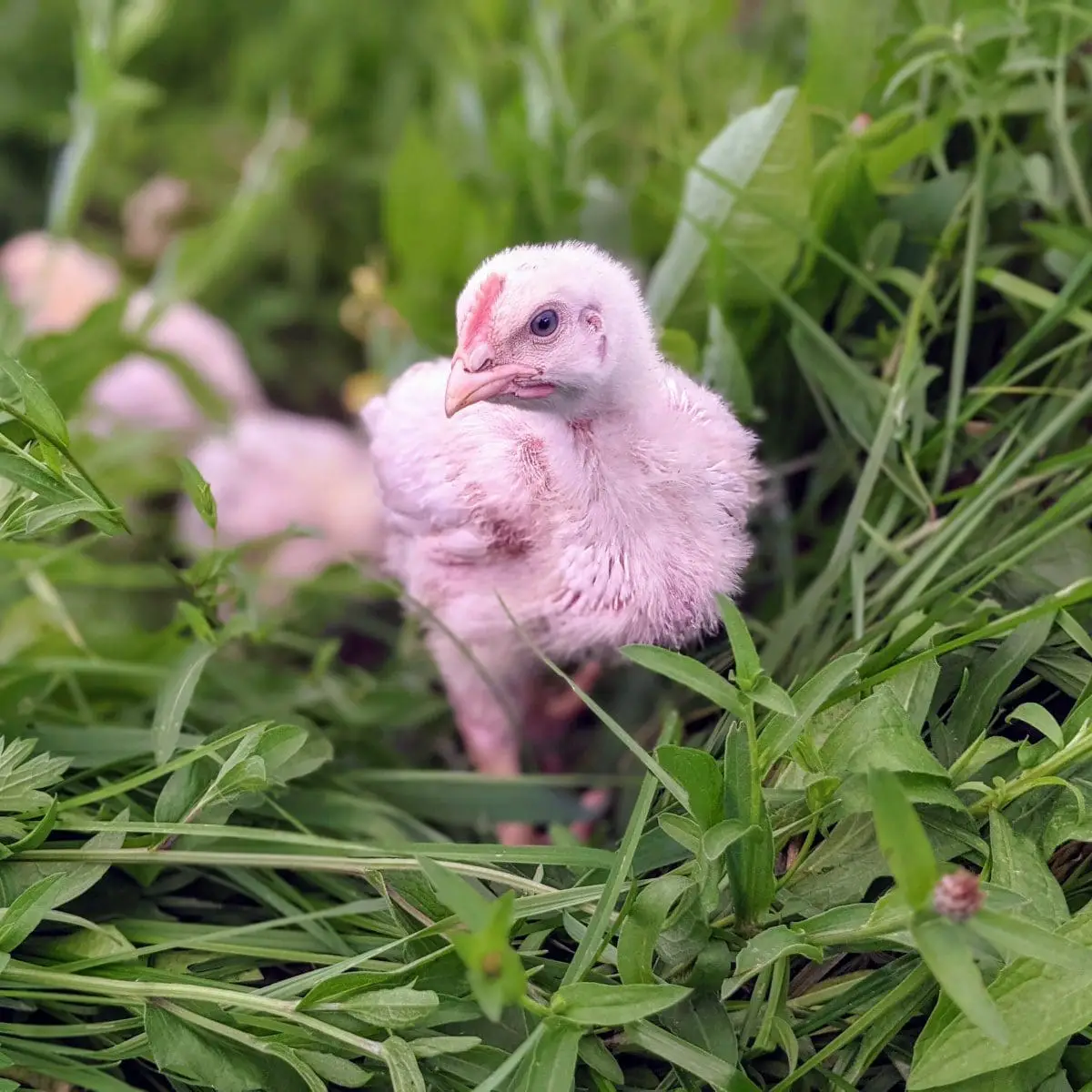We have been raising chickens on pasture since our first flock in 2011. Over the years, pasture raised, Certified Organic poultry has become our specialty. Let’s discuss what pasture raised means, how it works practically here on our farm in Upstate New York, and why we take this so seriously.
What Is Pasture Raised Poultry?
When we put the emphasis on pasture raised, we’re pointing out our fundamental belief that birds like chickens are best able to be themselves when given the opportunity to have fresh grass under their feet, to feel the wind ruffling their feathers, and to be able to take a nap in the sun. We want our Wrong Direction Farm birds out chasing bugs, with the room they need to flap their wings. That’s not too much to ask, is it?
Truly Pasture Raised

Our standards for pasture raised chickens are straightforward:
- Pasture raised chickens are always on grass (deep rooted, green grass)
- Pasture raised chickens are always on the move to fresh grass
The point about being on the move is probably the most important. Chickens love to scratch the ground while looking for bugs and seeds. Within just a few days a stationary chicken yard can become a patch of bare ground. We don’t want that to happen! We want our chickens to be able to scratch, but then to move on. Keeping the grass intact protects from erosion and sustains the soil’s biome. This requires us to be diligent about moving the chickens to fresh pasture.
The only exception to being out on pasture is during their first days after hatching when they need plenty of heat and special attention. Newly hatched chicks can’t regulate their own body temperature, so we’ve built a warm brooder space for them to get a healthy start. After they’ve grown their first true feathers we bring them outside.
What About Predators?
If we were to release our chickens into the wild, we’d quickly discover that we had no more chickens. There are a lot of animals in our area that would love to eat a chicken dinner. We have foxes, racoons, skunks, bald eagles, hawks, and coyotes all living on the farm. We occasionally have bears and bobcats passing through. So we need to find a balance that protects the chickens while giving them the amenities of outdoor living. We want wildlife to have their place in our ecosystem. Hunting all predators to extinction is not an appropriate solution.
The pasture protection system we use is based on a portable shelter of our own design. We weld together a sturdy shelter that uses greenhouse hoops on a heavy steel base. The base has towing points we attach to a pickup truck or tractor. From day to day we scoot the whole shelter to fresh grass. The ends and sidewalls have wire screening to keep predators out while allowing plenty of air to blow through. We have flaps we can roll down to keep the chickens dry in the event of stormy weather. This system has eliminated predator losses while enabling our chickens to thrive on our pastures.
What Do Our Pasture Raised Chickens Eat?
With all the emphasis we place on keeping the chickens on grass, you probably aren’t surprised to find out that our birds love to eat grass. In fact, you’ll sometimes see them swallowing down huge pieces that make you wonder how they can even get that much leafy material down the hatch. They also eat the other plants in our pastures, which include a diverse mix of species such as clovers, dandelions, burdock, alfalfa, etc. The varieties of pasture plants change with the season.
But chickens aren’t herbivores, eating only grass like our cattle (that’s why it is technically a misnomer to call them grass fed chickens). They are omnivores so their diet also includes insects, worms, seeds. They even eat bits of dirt and pebbles that serve as digestive aids.
If we had to guess which food is their favorite, we’d probably have to say either crickets or grasshoppers. It is a truly entertaining experience to watch our chickens zipping here and there on pasture chasing after these long-jumping insects.
To balance their diet, our chickens are also fed a mix of Certified Organic, locally milled, locally grown grain. We have always been advocates of using Certified Organic feed for our poultry, even though it costs us more than double the price of conventional grain. Our feeds are all non-GMO. And we never use chemical fertilizers, pesticides, herbicides, or fungicides. By encouraging the use of regenerative practices, we end up with less chemical pollution in our local watershed, so it is important to us that our chickens are eating responsibly produced feed.
We decided long ago that we didn’t want to eat food that contained synthetic ingredients, and so we didn’t want our chickens to eat it either. The same logic applies in keeping our pastured chickens antibiotic free, hormone free, and free of anything else that comes out of a laboratory; these things have no place in our food.
So in summary, the “big three” for pastured chicken feed include green plants, insects, and Certified Organic grain.

What About Winter?
At Wrong Direction Farm we want to be true to the seasonal realities of our climate. We farm in Upstate New York. We have beautifully mild summers and bracingly cold winters. Rather than fighting the snow and ice, we farm with the seasons of year when our pastures are best suited for chickens. We only raise chickens during the green months. Every chicken meal you buy from us came from a chicken that lived on green grass.
Of course we know you want chicken throughout the year, so we ensure that we have enough frozen to last through the winter. You can continue to enjoy the best pasture raised chicken even when the snow is drifting outside. All our packages are frozen and stored at -10 degrees F. We’ve done some experiments at home storing chickens for up to three years in the freezer with no change in taste or texture. Of course the chickens we offer for sale are always much fresher than that!
Healthy Chicken For Healthy People
At Wrong Direction Farm, our pasture raised poultry are healthier birds, no question about it. There have been plenty of studies showing that pasture raised chickens have superior nutritional characteristics. But we don’t really need to point out charts of Omega 3 to Omega 6 ratios. Our customers tend to understand intuitively that well-raised chickens are superior all around.
When we butcher our chickens and look side by side at supermarket chickens, the differences are apparent. Our chickens have stronger bones, larger gizzards, and brighter livers. It only stands to reason that chickens raised in a better environment turn out to be more robust.
For you, this naturally results in a better tasting chicken dinner. Pasture raised chicken has depth and texture. The dark meat is richer and the white meat is less likely to overcook. You probably have eaten too much bland chicken, the kind that only tastes like the flavorings added to it. Prepare to be amazed at how good chicken can be. Even the bones produce noticeably richer broths and soups when simmered. If you grew up in a place where chickens were still raised outdoors, you’ll recognize this taste from your childhood.
This is the pasture raised chicken you’ve been looking for. You will know in your body that this is great chicken.
Regenerative Ecological Chickens?
We believe that farming cannot continue with the extractive, destructive practices that so often characterize it. Our agriculture must work alongside our natural systems rather than against them. By pasture raising chickens, we can farm so we reverse the negative trends and restore our environment. Pasture raised farming is a regenerative agricultural practice.
Without going into the nerdy details of the soil testing analysis, we can describe the way we see pastured poultry changing the fields as we observe them over years. Our pastures have doubled their annual grass growth since we began raising chickens on them. The increased growth is resulting in more photosynthesis, more carbon dioxide capture, more soil organic matter. When we dug a trench for a water line though our oldest chicken pasture, we found grass roots stretching down past the bottom of the trench four feet below the surface. This means the plants are rooting deeper, sinking atmospheric carbon farther into the ground while pulling up rich minerals from deep in the soil profile.
As the soil organic matter rises, we continue to observe improvements in plant, insect, and wildlife diversity in our pastures. This is a system that can continually improve our environment rather than degrading it. This is special!

Getting Beyond the Marketing
We find that customers are bewildered by labels being used as attributes for chicken in the marketplace. And rightly so, since many of the labels are used in ways that do more to deceive than to illuminate. “Cage Free,” “Free Range,” “Outdoor Access,” and “Heirloom” have all been used to sell people something that is different than the product they are envisioning in their minds. Short of seeing what is actually going on at the farm, you really don’t know what you are getting.
At Wrong Direction Farm, we don’t ask you to trust the cleverly worded labels. We want to earn your trust. We want you to be confident that we’re showing you what is really happening on our farm, that we are involved in this work because we believe in it. As we post in our blogs and social media feeds, we use images that accurately and candidly reflect our farm. Even if you don’t have the opportunity to visit the farm, we want to present a genuine look into the ways our commitment to pasture raised chickens works itself out on our family’s farm.
Ready to Try Some Pasture Raised Chicken?
We deliver our grass fed and pasture raised meat to customers each week. Our chicken options include all the various cuts like breasts, drumsticks, thighs, and wings, plus whole chickens for roasting, organs, and even a mix of ground up chicken backs and trim we use here to feed our farm cats. Your order will arrive ice cold in a fully recyclable insulated package. We deliver throughout the Northeast, including New York (including Manhattan, Brooklyn, Bronx, Queens, Staten Island, and all of Long Island), New Jersey, Pennsylvania, Delaware, Connecticut, Rhode Island, Massachusetts, Vermont, New Hampshire, and Maine.
For those of you outside our delivery area, we’ve prepared a write-up on finding local pasture raised chicken.
